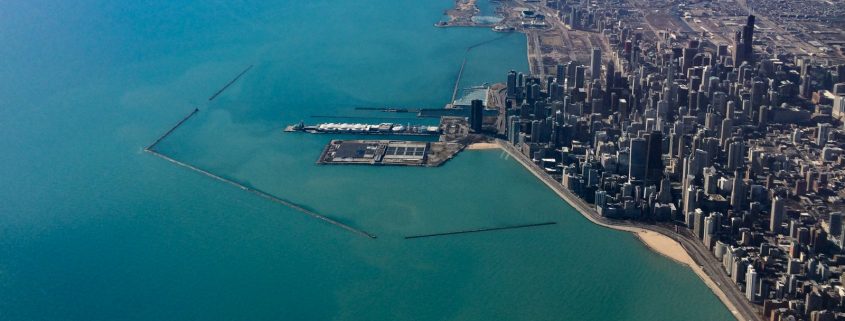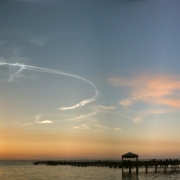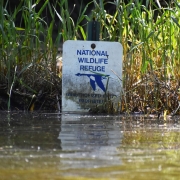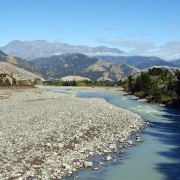Waukesha Great Lakes Diversion Approved
Governors vote to allow Wisconsin city to use Lake Michigan water in first exception to binational agreement.
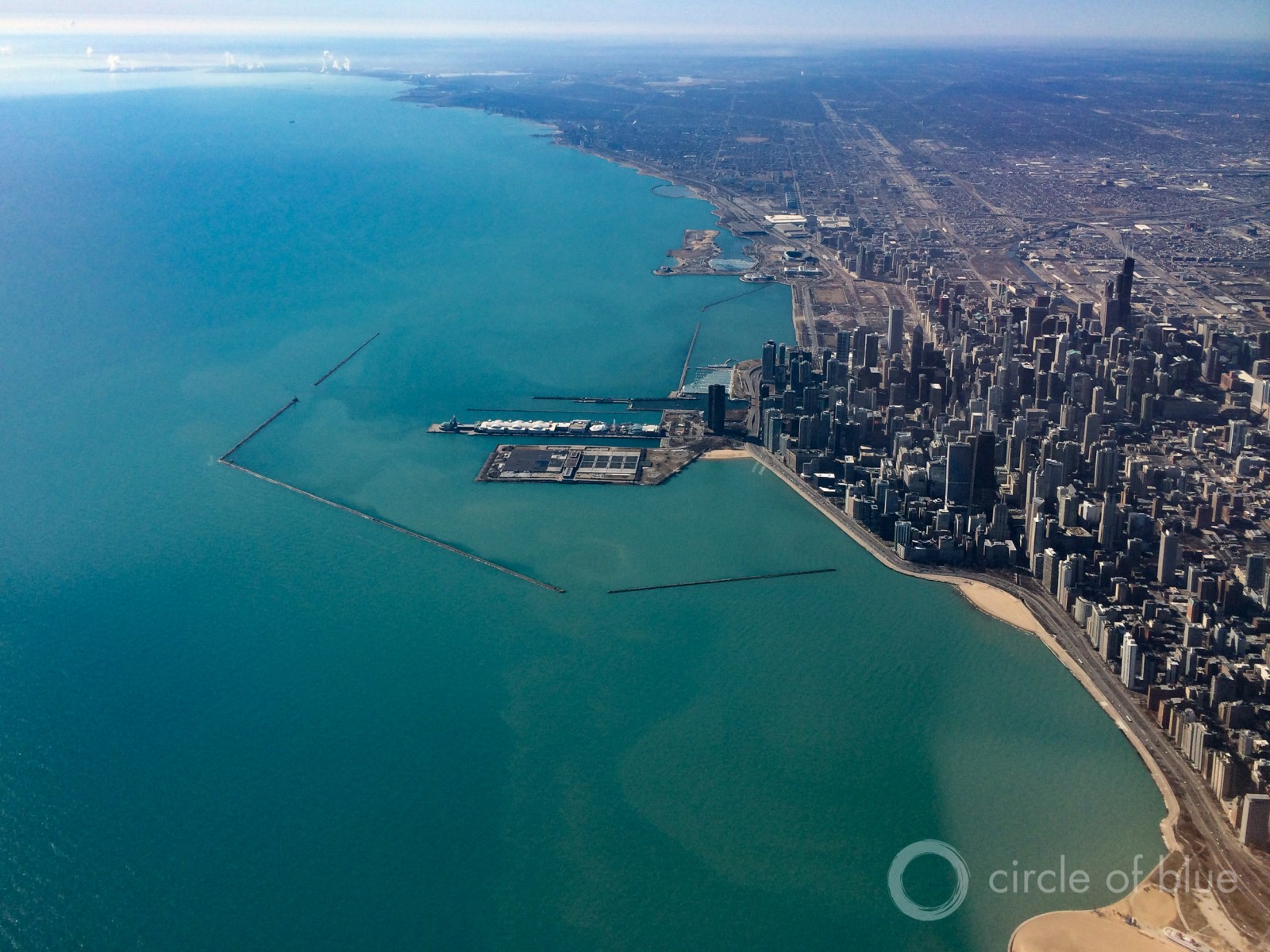
In a unanimous vote Tuesday in Chicago, the Great Lakes Compact Council approved the first out-of-basin diversion of Great Lakes water under the binational Great Lakes Compact. The decision grants Waukesha, Wisconsin access to Lake Michigan water for its municipal supplies. Photo © J. Carl Ganter / Circle of Blue
By Codi Kozacek
Circle of Blue
Eight Great Lakes governors voted unanimously to approve a diversion of Lake Michigan water to the city of Waukesha, Wisconsin, which lies just outside of the Great Lakes Basin. The landmark decision is the first exception to the 2008 Great Lakes Compact, a binational legal agreement between the eight Great Lakes states and two Canadian provinces meant to strictly limit out-of-basin water transfers.
Today’s approval by the Great Lakes Compact Council will allow Waukesha to take up to an annual average of 31 million liters (8.2 million gallons) of water per day from Lake Michigan, transport it through a pipeline to the city, and release the treated wastewater back to the Root River, a Lake Michigan tributary. That is less than the 38.2 million liters (10.1 million gallons) that Waukesha sought in its original application for an exception to the compact. Representatives of the governors also added amendments allowing the Compact Council and the states to enforce the conditions of the diversion, and allowing other basin states to audit Waukesha’s performance.
The decision will set an important precedent for other communities seeking to gain access to Great Lakes water. The Great Lakes Compact effectively bans diversions of Great Lakes water to cities that are located outside of the basin, but allows exceptions for those in counties that straddle the hydrological divide between the Great Lakes and other watersheds. Waukesha, a city of 70,000 people located 27 kilometers (17 miles) west of Lake Michigan in the Mississippi River watershed, qualified for an exception.
“The compact proved itself today in that it makes diversions very, very hard to achieve.” –Marc Smith, National Wildlife Federation
The city’s quest for Lake Michigan water, however, was long opposed by groups concerned about a potential run on Great Lakes water. Many believed the city’s original proposal loosened the strict protections set out under the 2008 compact. That viewpoint was echoed by representatives of all ten states and provinces, jointly called the Regional Body, that voted in May to trim the area that can be served by Waukesha’s diversion. Representatives from Minnesota abstained from that vote to allow more time to review the city’s application, and the governors of both Minnesota and Michigan were still deliberating just days before the Compact Council’s final vote Tuesday.
Despite the reservations, the Regional Body and the Compact Council both ultimately agreed that Waukesha has a legitimate claim to Great Lakes water under the compact. The city argued that a Lake Michigan diversion is its only route to a safe water supply. Waukesha is under a court order to alleviate naturally-occurring radium contamination in the deep aquifers it currently uses for municipal supplies, which it notes have dropped 107 meters (350 feet) below pre-development water levels.
“Over the last several months, I have given thorough consideration to this important decision, weighing carefully the long-term consequences the project could have on our Great Lakes, and the region’s environment. During that time, my administration gathered additional information about the Waukesha Diversion Project from a variety of communities and stakeholders, which I carefully reviewed,” said Minnesota Governor Mark Dayton in a statement following Tuesday’s vote. “Those additional efforts, the counsel of our state’s experts, and several important modifications to the previous proposal, have assured me that approving the Diversion Project will provide environmental benefits to the region, and have virtually no impact on our treasured Great Lakes. Therefore, I have voted to approve the project.”
Governor Dayton noted that the area that can be served by the diversion was significantly reduced from Waukesha’s initial proposal, and that nearly all of the diverted water will be returned to Lake Michigan through the Root River.
Major Concerns Addressed
The rigorous approval process, and the conditions added to Waukesha’s diversion request, also addressed many of the concerns held by groups that initially opposed the project.
“If the application had moved forward and was approved as it was submitted, I think there you would have a big concern about a bad precedent being established that would allow other communities to do the same and submit applications for diversions that did not meet the standard of the compact,” Marc Smith, senior policy manager for the National Wildlife Federation’s Great Lakes Regional Center, told Circle of Blue. “You would have a more cumulative problem of many communities getting a diversion approved that would weaken the Great Lakes Compact as a whole. Given the fact that they changed this and improved it with these conditions sets a very tough path fur any future applicant.”
Smith added that Waukesha’s bid for Great Lakes water will come at a steep cost. The city has already spent more than $US 5 million developing its application for an exception to the compact, and will spend an estimated $US 207 million to build the infrastructure necessary to transport and treat the diverted water.
“The compact proved itself today in that it makes diversions very, very hard to achieve,” said Smith. “If you are going to apply for Great Lakes water, you have to meet the standards, and you better have the economic ability to do this.”
Ensuring Waukesha’s compliance with the terms of the diversion will be vital for upholding the strict standards set forth under the compact, according to the National Wildlife Federation and other civil society groups that have been following the issue closely.
“Today’s vote is not the end of the story. Great Lakes advocates will need to be vigilant in making sure that the city of Waukesha and the State of Wisconsin honor the terms of the agreement,” the NWF and the Chicago-based Alliance for the Great Lakes wrote in a joint statement Tuesday. “We will be strong watchdogs to ensure that the Great Lakes are protected. We expect that the Compact Council and its members will act promptly if Waukesha and Wisconsin do not meet every requirement imposed by the Council. And, if necessary, we will take action to compel compliance with the Compact Council’s requirements. Moving forward, we strongly encourage the Regional Body and Compact Council to amend their processes to include improved opportunities for the public to participate in a meaningful and timely way throughout the regional review process no matter where they live.”
They will also be assessing the diversion application evaluation process pioneered over the past six months. A prominent issue already raised has been a lack of adequate public access to events. The final deliberations Tuesday in Chicago were open to the public, but were not broadcast live as past meetings have been.
A news correspondent for Circle of Blue based out of Hawaii. She writes The Stream, Circle of Blue’s daily digest of international water news trends. Her interests include food security, ecology and the Great Lakes.
Contact Codi Kozacek

